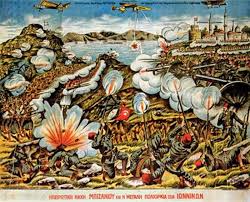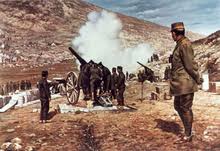
The 107th anniversary of the Freeing of Ioannina and its incorporation as part of the Greek State is being celebrated this year, 2020.
The battle for the freedom of Ioannina was a very symbolic military action for the newly founded Greek State against the Ottoman Empire on the Epiros front during the First Balkan War between October 1912 and May 1913.

The symbolic day of 21st February (with the Old Style calendar) or 6th March (with the New Style calendar) 1913 marked the liberation of Ioannina (Greek: Ιωάννινα, Γιάννενα) in Epirus (Greek: Ήπειρος). This moment did not come without sacrifice. It had taken years of planning from one generation to the next until finally the Ottoman Army surrendered to the successor of the Greek throne, Constantine, who was at the head of the Greek Army. When the Greek Army reached the fortified township of Ioannina, the Greeks within the walls did whatever they could to help the cause. At that period of time, before the First and Second Balkan Wars, the Ottoman Empire stretched from the Adriatic Sea to the whole of the Balkan Peninsula. The Greek Army started its campaign from Arta and continued through to Elassona and Tempi, fighting the Ottoman Army all the way through the harsh winter months. They won battle after battle due to the heroic stand and the solidarity of the soldiers that took part as well as the help given by the Greek population in the area of Epirus.

Ioannina, from 1204 until 1430, was one of the largest and most important economic and cultural centres of the area. It was founded in the 6th century AD by the Byzantine Emperor Justinian, who was the Eastern Orthodox emperor from 527 to 565 AD. In 1430, Ioannina succumbed to Ottoman rule when the area was overrun by the Ottoman Army. However, the social, economic and commercial nucleus of Ioannina had already been formed along true Greek traditions, which were kept alive throughout Ottoman rule. This tradition formed the core for the future fight for freedom and independence.
The First Balkan War between October 1912 and May 1913, comprised actions of the Balkan League made up of Greece, Bulgaria, Serbia and Montenegro against the Ottoman Empire. The freeing of Ioannina and Epirus as a whole, was an entirely Greek engagement. The Battle of Bizani (Greek: Μάχη του Μπιζανίου) was the turning point for the Greek forces in the First Balkan War. At the beginning, the Greek army was heavily outnumbered (Ottomans = 35,000, Greeks = 25,000) and could not attempt an offensive against the German-designed defensive positions of Bizani that protected the approaches to Ioannina. They had to wait for reinforcements from the Macedonian front after the operations there had been successfully completed. As a result of the well-executed Greek advance, the Ottoman forces were cut off from the rest of the Ottoman army and its headquarters in Ioannina.

Ottoman troops tried to escape, but were captured by the Greek forces. Esat pasha, commander of the Ottoman forces, realized that the battle was lost. He therefore contacted the foreign consulates in Ioannina and sought help in negotiating a surrender. On March 6 or 21 February by the Old Style calendar, he agreed upon the unconditional surrender of Ioannina and the Ottoman garrison to the Greeks. The following day the Greek forces under Crown Prince Constantine were parading through the flag-covered streets of the city.
The historian Richard Hall, refers to the Battle of Bizani and the fall of Ioannina as Greece’s greatest military achievement in the First Balkan War because although Greece did not have the numerical superiority, the decisive factor was the way the operations had been planned that led to a well coordinated and executed assault that left no opportunity for the Ottoman side to react in time. Ottoman oppression had finally come to an end.